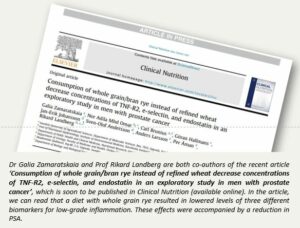2019
2019-04-09
Galia Zamaratskaia, SLU
Rikard Landberg, Chalmers

Hello Galia!
Tell us about why you chose to investigate the effect of whole grain rye on prostate cancer?
Prostate cancer is one of the most common cancers among men and it has been associated with low-grade inflammation. Low-grade inflammation is invisible and can go on for many years undetected, silently causing damage and increasing the risks for many diseases. We know that the risk of low-grade inflammation can be reduced with a healthy diet, but specific dietary ingredients and mechanisms of their action are poorly understood. In this study we tested the hypothesis if consumption of whole grain rye can reduce low-grade inflammation.
What is the main scientific finding of the study?
The main and exciting finding is a reduction of some low-grade inflammation biomarkers after consumption a diet rich in whole grain and bran of rye. We speculate that these effects may contribute to slower prostate tumor progression, but of course we are well aware that further studies on a larger population are needed to confirm our findings and identify the underlying mechanism. It could also be that the effect on PSA which indicates slower prostate tumor growth occurred in parallel with the reduction in inflammation biomarkers we observed in the present study.
What does it really mean to men with prostate cancer that TNF-R2, e-selectin, and endostatin levels can be lowered by eating whole grain and bran products rye bran?
Unfortunately, it is impossible to translate findings from one small study in humans into practise for a patient group. Many studies are needed to validate suggestive findings from exploratory, small studies as the present. However, our results are very interesting and they are in line with other studies that have suggested high fibre diets may lower the low-grade inflammation which involved in the development of many chronic diseases including cancer. Recommending high intake of whole grain foods is aligned with our general dietary recommendations and that is totally in line with our findings. So I would recommend all to choose whole grains whenever consuming cereal foods, says Galia.
Tell us more about the impact of your results. What is the next step?The next step is to use a larger population to investigate an impact of whole grain rye on both low-grade inflammation and development of chronic diseases. It would also be beneficial to understand the effect of processing on final health effect. Does whole grain rye have higher effects if consumed in form of bread or for example porridge, how often it should be consumed and even the interaction with other dietary components needs careful investigations before any recommendation can be given. We still have a lot of work to do.
In this study we added another piece to the puzzle to the understanding of why high-fibre foods are associated with lowered risk of developing chronic disease, says professor Rikard Landberg, professor in Food Science at Chalmers. As pointed out, our study was small and therefore we need larger studies to confirm the findings.


Senior Lecturer Head of Department
Molecular Sciences, SLU Food and Nutrition Science, Chalmers
Zamaratskaia G, Mhd Omar NA, Brunius C, Hallmans G, Johansson JE, Andersson SO, Larsson A, Åman P, Landberg R (2019) Consumption of whole grain/bran rye instead of refined wheat decrease concentrations of TNF-R2, e-selectin, and endostatin in an exploratory study in men with prostate cancer. Clin Nutr. 2019 Jan 15 doi: 10.1016/j.clnu.2019.01.007. [Epub ahead of print]


